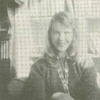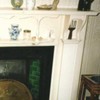Hatches: Great image, you in class, electrified by this new weird world of poetry.
Stacy: yes, run out and see it and let's compare notes!
Tonya: Gosh! I think you do have a lot of it right on despite having read it long ago.
As I mentioned earlier, I was obsessive when it came to Plath. Now, I have a healthy fascination. I still have an entire shelf in my bookcase in my room devoted just to Sylvia: all of her poems, the bell jar, several (5 or 6) biographies, a couple of editions of her journals, and her unfortunate collection of short stories, "Johnny Panic and the Bible of Dreams." I also have two cassette recordings of her reading her poems; one is of poems from The Colossus, the other is all Ariel poems and is absolutely astounding. I'd be happy to copy this for one or two fans who may find it of interest.
In an interview on MTV many years ago, Morrissey was asked about his literary influences, and whether he was into Plath or Sexton at all. He professed great admiration for Sexton, but of Plath, he said, dismissively, "I think her life and death were far more interesting than anything she ever wrote." While I disagree completely, there is something magnetic about her life story. I've had a compulsion to read each bio, and have been fascinated by this strange and brilliant woman's existence. It was never enough for me to read her writing and find pleasure there alone. I had to seek her out, go where she went, see where she lived. I had to go to these places in the way that some go to Graceland.
I traveled all over England in between course work with the goal of seeing and photographing as many of Sylvia's old haunts as possible. In Cambridge, I had the (still unbelievable) experience of knocking on the door of a tiny house that Sylvia and Ted lived in shortly after their marriage. A man answered, and I explained somewhat sheepishly that my favorite poet used to live there... he replied, "would you like to come in?" I nearly fell over. I sat in the kitchen with him and his wife and listened as they explained that they, too, were Plath fanatics and had bought the house because it had been hers. For the first time in a few months (as my classmates were off seeing more exotic sights) I felt a little less psycho. I was led into the room that had been her bedroom, and there was a small table there on which stood a collection of her writings. Then I was taken to the living room, where I gasped upon seeing a very familiar fireplace and mantle. There is a well known picture of Sylvia sitting beside the fireplace, and here I was standing before it: the same woodwork and everything. Shelves nearby removed, but mantlepiece totally unchanged. I snapped away with my camera, and my kind hosts indulged me. [I'll scan these pix at the bottom...SAD, i know.] We then went to the back garden where an apple tree that Sylvia had written about still stood, its branches gnarled like arthritic fingers.
In college, I finagled my way into doing many papers and much research on her. Hatches, like you, my brain first clicked with poetry on reading Plath. That amazement that happens when you read something that consists of so few words and you realize that you have just been taken so far so fast...it's an extreme economy of language. And so beautiful to read something and feel that it contains not a single surplus word. Each is essential. This is what her work first showed me.
It's a shame that so many people know Plath as just "the author of The Bell Jar." She was rather embarassed by that book, called it a "potboiler," something to make a quick buck off of. And unfortunately, Frieda Hughes, Ted and Sylvia's daughter, did not permit any of her mother's writing to be used in
Sylvia, and the movie suffers for it. So, since we're just starting out with this topic, I'll take the liberty of posting all of "Daddy" here, widely regarded as among her very best poems:
quote:
Daddy
You do not do, you do not do
Any more, black shoe
In which I have lived like a foot
For thirty years, poor and white,
Barely daring to breathe or Achoo.
Daddy, I have had to kill you.
You died before I had time---
Marble-heavy, a bag full of God,
Ghastly statue with one gray toe
Big as a Frisco seal
And a head in the freakish Atlantic
Where it pours bean green over blue
In the waters off the beautiful Nauset.
I used to pray to recover you.
Ach, du.
In the German tongue, in the Polish town
Scraped flat by the roller
Of wars, wars, wars.
But the name of the town is common.
My Polack friend
Says there are a dozen or two.
So I never could tell where you
Put your foot, your root,
I never could talk to you.
The tongue stuck in my jaw.
It stuck in a barb wire snare.
Ich, ich, ich, ich,
I could hardly speak.
I thought every German was you.
And the language obscene
An engine, an engine,
Chuffing me off like a Jew.
A Jew to Dachau, Auschwitz, Belsen.
I began to talk like a Jew.
I think I may well be a Jew.
The snows of the Tyrol, the clear beer of Vienna
Are not very pure or true.
With my gypsy ancestress and my weird luck
And my Taroc pack and my Taroc pack
I may be a bit of a Jew.
I have always been sacred of you,
With your Luftwaffe, your gobbledygoo.
And your neat mustache
And your Aryan eye, bright blue.
Panzer-man, panzer-man, O You----
Not God but a swastika
So black no sky could squeak through.
Every woman adores a Fascist,
The boot in the face, the brute
Brute heart of a brute like you.
You stand at the blackboard, daddy,
In the picture I have of you,
A cleft in your chin instead of your foot
But no less a devil for that, no not
Any less the black man who
Bit my pretty red heart in two.
I was ten when they buried you.
At twenty I tried to die
And get back, back, back to you.
I thought even the bones would do.
But they pulled me out of the sack,
And they stuck me together with glue.
And then I knew what to do.
I made a model of you,
A man in black with a Meinkampf look
And a love of the rack and the screw.
And I said I do, I do.
So daddy, I'm finally through.
The black telephone's off at the root,
The voices just can't worm through.
If I've killed one man, I've killed two---
The vampire who said he was you
And drank my blood for a year,
Seven years, if you want to know.
Daddy, you can lie back now.
There's a stake in your fat black heart
And the villagers never liked you.
They are dancing and stamping on you.
They always knew it was you.
Daddy, daddy, you bastard, I'm through.
Not an extra word, and it's so musical, so lyrical...Plath herself said that these "Ariel" poems, written in the months immediately preceding her death, couldn't stay on the page, they must be read aloud, in the tradition of the first poets who served as court jesters and recited witty ditties to amuse royals... Oy, 'nuf for tonight.
[This message was edited by Michael Madison on 10-29-03 at 12:17 AM.]


